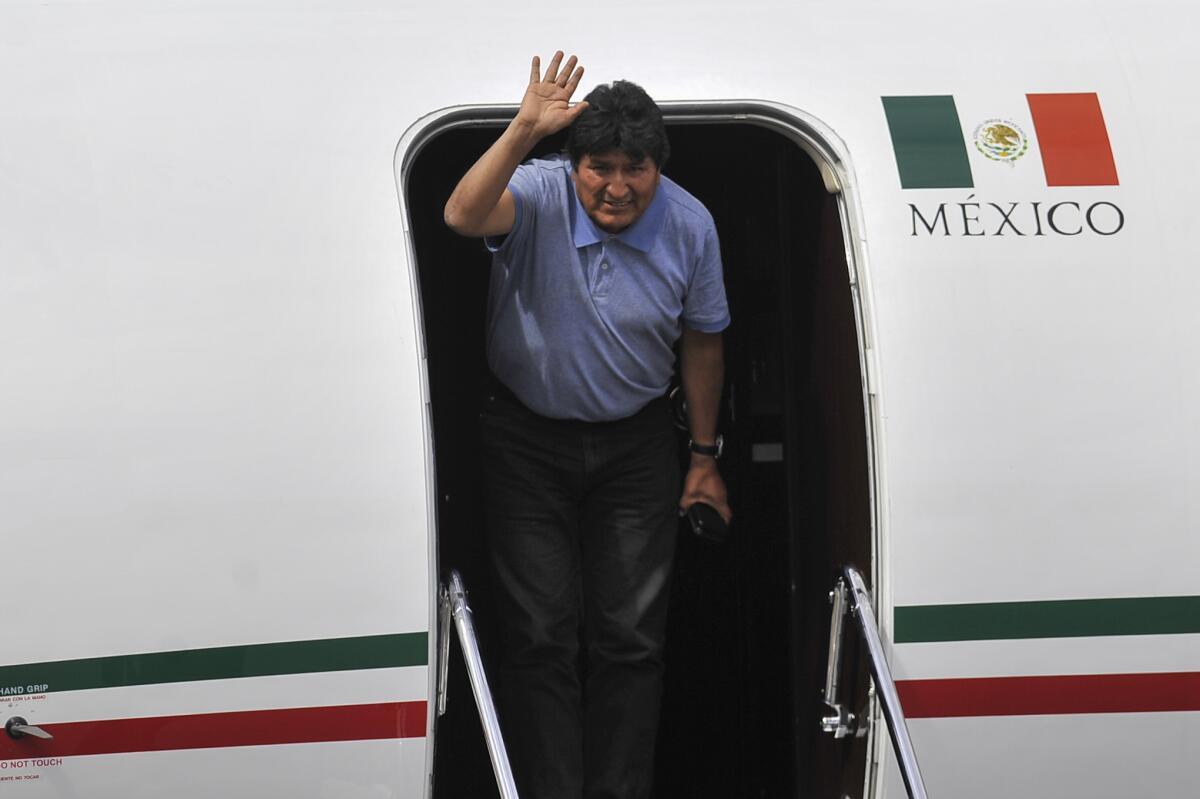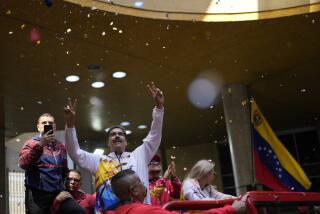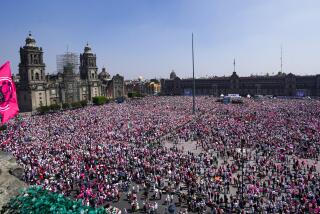Bolivian interim leader says Evo Morales can’t run in new vote and asks Mexico to muzzle him

Bolivia’s interim government wants Mexico to muzzle Evo Morales, outspoken ex-president of the Andean nation.
Morales, who resigned his post on Sunday amid allegations of electoral fraud, arrived in Mexico on Tuesday, the recipient of political asylum from the Mexican government.
But he has not left quietly, assailing as illegitimate the government of self-appointed interim Bolivian President Jeanine Añez, who called Morales’ broadsides from Mexico inflammatory.
In another pronouncement Thursday, Añez, said Morales and his former vice president, who also resigned, could not run in any new elections. But it was unclear whether she had the legal authority to make such a determination.
Añez also told reporters that members of Morales’ Movement Toward Socialism Party — which dominates the national legislature — would “have the opportunity to choose the representatives whom they want.”
Morales has repeatedly denounced the “coup” that he said drove him from office and declared he would be willing to return to Bolivia for a “national dialogue” if “my people” asked.
His comments have enraged Añez, who on Thursday said her government would issue a formal complaint to Mexico.
“Evo Morales, from his exile, is breaking all protocols because he should not be making public declarations,” Añez told reporters in La Paz, the Bolivian capital. He “doesn’t have the right to be making public manifestations inciting the population from where he is.”
There was no immediate response from the Mexican government, which has welcomed Morales and called him a coup victim. Morales thanked Mexico for “saving my life” and said he was pressured to leave by the head of the Bolivian armed forces.
Morales’ critics say the ex-president left Bolivia when it became apparent that he had lost the support of the majority of the population — along with losing the backing of the military and police — and that rigged balloting had helped him win a fourth term.
In Bolivia, Morales’ supporters have been staging daily demonstrations. Millions of Bolivians, especially the country’s poor and indigenous populations, revere the ex-leader, who rose from humble origins to become the country’s first president from an indigenous group, serving for almost 14 years.
Mexican President Andres Manuel Lopez Obrador, who was elected last year on an anti-establishment platform as Mexico’s first avowed leftist president in a generation, is an admirer of Morales, a socialist.
“Hopefully it is recognized how he [Morales] ... lifted Bolivia from being a country with much poverty,” Lopez Obrador told reporters Wednesday. “He should feel at home in Mexico.”
Morales’ economic policies have been credited for helping reduce poverty, improve education and provide increased opportunities for the people in Bolivia, long among the poorest countries in the hemisphere.
But critics accused Morales of increasingly autocratic tendencies and of aspirations to be president for life. He ran for a fourth term despite a 2016 national referendum in which a majority of Bolivian voters rejected his plan to end existing term limits that would have blocked him from running.
In Mexico, observers wondered whether allowing Morales a political soapbox violated Lopez Obrador’s stated goal of not interfering in the politics of other nations. Some have also raised concerns that Mexico’s embrace of Morales, an icon of the international left, could damage the country’s most important international relationship — with the United States and the Trump administration.
Morales, an admirer of Fidel Castro and an acolyte of the late Venezuelan President Hugo Chavez, is a fierce critic of U.S. “imperialism” and has blamed his downfall on “a political and economic conspiracy” from Washington.
Morales has also assailed Añez, a conservative opposition senator who declared herself interim president Tuesday, saying the move was needed to fill a leadership vacuum and quell ongoing violent street protests.
From Mexico via Twitter, Morales labeled Añez’s accession “the most devious and evil coup in history.”
Mexico has not recognized Añez as Bolivia’s interim president, even as she has appointed a Cabinet and new military and police chiefs, and vowed to hold new elections soon.
But U.S. Secretary of State Michael R. Pompeo said in a statement that he applauded Añez “for stepping up as Interim President of State to head her nation through this democratic transition.”
Meanwhile, United Nations Secretary-General Antonio Guterres said Thursday that he was dispatching a personal envoy, veteran diplomat Jean Arnault, to help quell Bolivia’s political crisis. Morales applauded the U.N. move.
Cecilia Sanchez of The Times’ Mexico City bureau contributed to this report.
More to Read
Start your day right
Sign up for Essential California for news, features and recommendations from the L.A. Times and beyond in your inbox six days a week.
You may occasionally receive promotional content from the Los Angeles Times.






